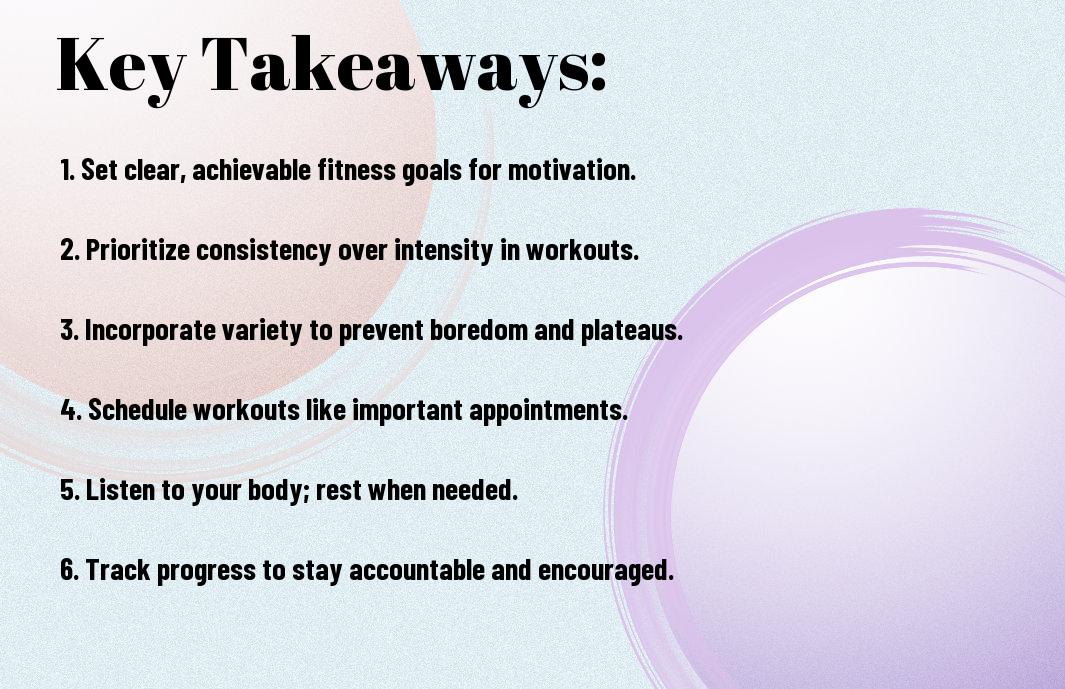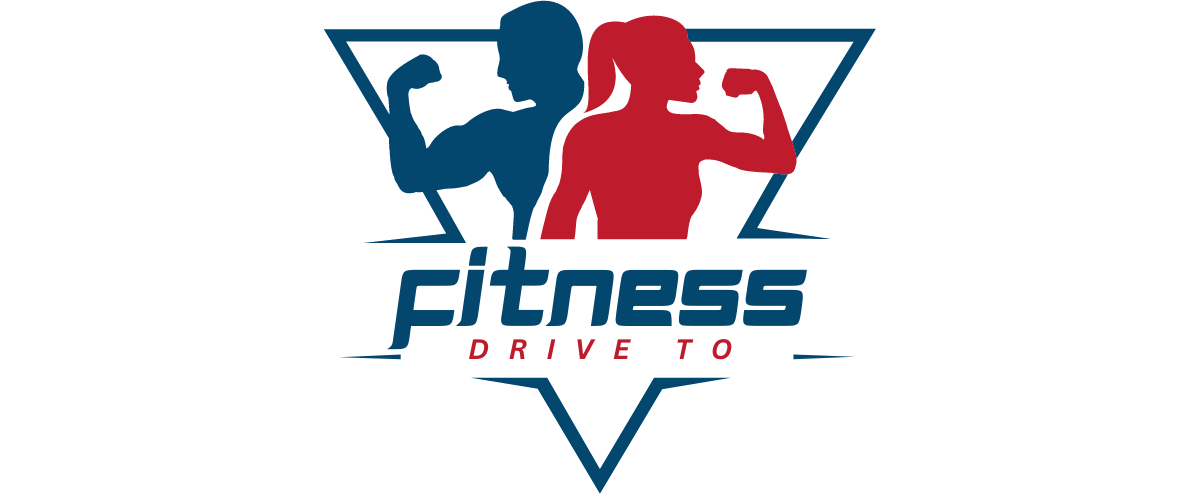There’s a world of information out there about fitness, but understanding how to create a sustainable workout routine tailored to your lifestyle can be overwhelming. You need an approach that not only fits your current life but also evolves with you. By incorporating realistic goals, finding enjoyment in your activities, and listening to your body, you can build a regimen that promotes long-term wellness. This guide will provide you with important tips for mastering your fitness system, ensuring you stay motivated and on track to reach your personal best.
Key Takeaways:
- Consistency: Establishing a routine that fits your lifestyle is crucial to achieving long-term success in fitness.
- Variety: Incorporating different types of workouts can prevent boredom and keep you engaged, promoting a sustainable practice.
- Goals: Setting realistic and attainable fitness goals helps in creating a sense of purpose and keeps you motivated.
- Rest and Recovery: Allowing time for your body to recover is vital for maintaining physical health and preventing burnout.
- Support System: Engaging with a community or having workout partners can enhance accountability and make the journey more enjoyable.

Understanding Your Fitness Goals
A clear understanding of your fitness goals is necessary for developing a sustainable workout routine. Without defined goals, it’s easy to lose motivation or become overwhelmed. Take the time to reflect on what you want to achieve—be it weight loss, muscle gain, increased endurance, or overall health improvement. Once you identify your objectives, you can tailor your routine to align with your aspirations, helping you stay focused and committed on your journey to better health.
Setting Realistic Objectives
Goals should be specific, measurable, achievable, relevant, and time-bound (SMART). Setting objectives that are too ambitious can lead to frustration and burnout. Break your larger goals into smaller milestones to maintain motivation and celebrate your progress. Whether it’s jogging three times a week or mastering a new exercise, make sure your objectives are attainable within your current lifestyle and fitness level.
Identifying Your Motivation
Your motivation is the driving force that will keep you committed to your fitness journey. Consider what inspires you to pursue your goals. Whether it’s a desire to feel more energetic, improve your health, or enhance your appearance, identifying this core reason can help you push through challenges. By concentrating on your motivations, you build a strong foundation that supports your commitment to consistency and growth.
A deep understanding of your motivation can significantly impact your ability to maintain a workout routine. Having a strong “why” helps you navigate the inevitable ups and downs of fitness. When faced with obstacles, such as a busy schedule or fatigue, your motivation can serve as a reminder of what you’re striving for. Whether it’s keeping up with your kids or fitting into a favorite outfit, allow your personal motivations to guide your journey and transform challenges into progress.

Designing Your Workout Routine
The key to designing an effective workout routine is to tailor it to your personal goals, preferences, and lifestyle. Start by determining what you want to achieve, whether it’s weight loss, muscle gain, or overall wellness. Consider the frequency of your workouts and choose activities that you genuinely enjoy to make consistency easier. Mixing various types of training will keep your routine fresh and engaging. As you design your plan, don’t forget to include progressive overload to challenge yourself over time and promote continuous improvement.
Balancing Cardio and Strength Training
The ideal workout routine includes a balance between cardio and strength training. Cardio is vital for improving heart health and burning calories, while strength training builds muscle and increases metabolism. Aim to incorporate both types of exercises throughout the week. A good approach could be alternating between cardio and strength days, or integrating them into a single session, ensuring that you address all aspects of fitness effectively and maximize your results.
Incorporating Flexibility and Recovery
Workout routines should not neglect the importance of flexibility and recovery. These elements help prevent injury and promote overall muscle health.
But prioritizing flexibility and recovery in your routine is vital for long-term success. Incorporate dynamic stretches before each workout and static stretches afterward to enhance your range of motion and avoid muscle tightness. Additionally, consider taking active recovery days with lighter activities like yoga or walking to allow your muscles to rest and repair. Listening to your body is important; don’t hesitate to take a break when needed. This approach will keep you injury-free and maintain your motivation over time.
Creating a Schedule
Many individuals struggle with maintaining a workout routine due to a lack of structure. Creating a consistent schedule is important for incorporating fitness into your daily life. By setting aside dedicated time for your workouts, you not only make exercise a priority but also develop a habit that enhances your overall well-being. Consider your personal commitments and identify specific days and times that work best for you, ensuring your fitness goals become an integral part of your lifestyle.
Finding Your Workout Time
Around the same time each day, try to carve out a regular slot for your workouts that fits seamlessly into your schedule. Whether you are an early riser who prefers morning sessions or someone who finds evening workouts more manageable, consistency is key. Take note of when you have the most energy and motivation, and use that insight to create a sustainable routine that sticks.
Prioritizing Consistency
Schedule your workouts just as you would any important appointment or meeting, treating them with the same respect and urgency. It’s relatively simple to prioritize fitness; just ensure you show up regularly. By committing to your schedule and setting clear goals, you will develop and maintain a routine that fosters lasting results. Stay adaptable, but keep the foundation of consistency as your focus. Each small step you take links back to your overarching fitness journey, building strength and resilience along the way.
At some point, you’ll find that consistency becomes second nature in your routine. Embrace the idea that showing up, even on days when motivation wanes, is a significant part of your progress. The more frequently you stick to your schedule, the more you will see benefits not just physically, but mentally as well. Your body will learn to expect these workout sessions, making it easier to prioritize them in the future. With a steadfast commitment, you foster both discipline and a positive relationship with fitness, paving the way for a healthier lifestyle.
Nutrition and Hydration
Unlike exercise, the benefits of proper nutrition and hydration can often be overlooked in your fitness journey. Yet, incorporating a balanced diet is vital to enhance your performance and recovery. Consider reading about Mastering Your Fitness Resolutions: A Comprehensive Guide to Lasting Success for further insights on how to fuel your body effectively.
Fueling Your Body for Performance
Below, you’ll find that optimal nutrition is the foundation of physical performance. A well-balanced diet rich in carbohydrates, proteins, and fats provides the energy needed for your workouts. Lean proteins aid muscle recovery, while complex carbohydrates supply sustained energy. Additionally, incorporating whole foods over processed options can enhance your overall health and fitness goals.
Importance of Staying Hydrated
Above all, hydration plays a significant role in your fitness routine. Consuming adequate water ensures that your muscles function properly and can stave off fatigue. Dehydration can lead to decreased performance, cramps, and longer recovery times, making it imperative to replenish lost fluids during and after exercise.
With hydration, it’s vital to recognize that even mild dehydration can impair your performance significantly. Maintaining good hydration levels helps regulate your body temperature, transport nutrients, and prevent unwanted fatigue. Additionally, staying hydrated supports your mental clarity and focus, allowing you to push through tough workouts and enhance your overall results. Prioritize drinking water before, during, and after your sessions to ensure optimal performance and recovery.

Tracking Progress
Keep a close eye on your fitness journey by regularly tracking your progress. This not only provides motivation but also helps you to identify areas of improvement. Documenting your workouts, nutrition, and recovery allows you to see patterns and make smarter decisions personalized to your specific needs and goals.
Utilizing Fitness Apps and Tools
Utilizing fitness apps and tools can significantly enhance your ability to track progress effectively. Many of these applications allow you to log workouts, monitor nutrition, and even set reminders for training sessions. By leveraging technology, you gain insights into your habits, making it easier to stay committed to your routine and accomplish your fitness objectives.
Adjusting Your Routine Based on Results
On your fitness journey, it’s important to frequently assess your progress and adjust your routine based on results. Stagnation can occur if you stick with the same exercises or intensity levels without modification.
Indeed, adjusting your routine based on results can make all the difference in achieving your goals. If you find that your progress has plateaued, it may be time to mix up your exercises, increase workout intensity, or modify your nutrition. Listening to your body is imperative; if you feel fatigued or notice a decline in performance, scaling back may be needed. Conversely, if you’re consistently hitting your targets, consider incorporating more challenges to drive further improvements. Adapting your routine proactively ensures that you continuously engage your muscles and build on your achievements effectively.
Overcoming Obstacles
Once again, you may encounter various obstacles that threaten your fitness journey. These challenges can range from lack of time and motivation to physical limitations and emotional setbacks. Understanding that hurdles are a natural part of any routine empowers you to develop strategies to sidestep or transform these barriers into stepping stones toward your goals.
Staying Motivated When Challenges Arise
With each challenge, keeping your motivation high requires a proactive approach. Focus on setting small, achievable goals that reignite your passion for fitness. Incorporate diverse activities to keep your routine fresh and enjoyable, allowing room for adjustments that align with your current state of mind and body.
Finding Support and Accountability
With the right support system, you can navigate through difficult times more effectively. Surrounding yourself with friends, family, or a workout community can provide the encouragement needed to stay committed to your fitness goals. Engage in group classes, online forums, or social fitness apps that foster connection and share your progress to hold yourself accountable.
Also, having a support network can significantly enhance your journey. By surrounding yourself with like-minded individuals who share your fitness interests and objectives, you’re less likely to feel isolated during difficult times. Establish regular check-ins with your support group to share your progress, celebrate milestones, and discuss challenges. This creates a sense of responsibility to keep yourself on track and lets you draw upon others’ experienced insights when you need motivation, fostering an environment where everyone thrives together.
Summing up
Drawing together the insights from mastering your fitness system, creating a sustainable workout routine involves understanding your personal goals, finding enjoyable activities, and incorporating flexibility into your schedule. By prioritizing consistency over intensity and listening to your body’s needs, you can maintain motivation and prevent burnout. Establishing a supportive environment and tracking your progress will further enhance your commitment, allowing you to cultivate a healthier lifestyle that lasts. With these tips, you’ll be well-equipped to develop a routine that fits your life and keeps you engaged in your fitness journey.
FAQ
Q: What are the key components of a sustainable workout routine?
A: A sustainable workout routine typically includes a balance of cardiovascular exercise, strength training, and flexibility work. It’s important to set clear and realistic goals while also considering your current fitness level. Additionally, incorporating variety in your workouts can keep things interesting and prevent burnout. Listen to your body, and don’t forget the importance of rest and recovery in your routine.
Q: How can I fit a workout routine into a busy schedule?
A: To integrate a workout routine into a hectic lifestyle, it helps to prioritize your fitness as you would any important appointment. Set aside specific days and times for workouts and treat them like unmissable events. You can also opt for shorter, high-intensity workouts that require less time but still provide benefits. Consider incorporating physical activity into your daily commute or break times when possible.
Q: What strategies can help me stay motivated to stick to my fitness program?
A: Staying motivated can be achieved through several strategies. Establishing a supportive community, such as a workout buddy or group, can provide accountability. Setting short-term goals and tracking your progress can also create a sense of achievement. Lastly, reward yourself for reaching milestones—this could be as simple as treating yourself to a relaxing spa day or new fitness gear.
Q: How do I know if my workout routine is effective?
A: An effective workout routine should align with your personal fitness goals, whether it’s losing weight, building muscle, or improving endurance. Regularly evaluate your progress by taking measurements, tracking workout performance, or monitoring changes in energy levels and overall well-being. If you’re not seeing results, consider modifying your routine or consulting a fitness professional for guidance.
Q: What role does nutrition play in sustaining a workout routine?
A: Nutrition plays a significant role in supporting your fitness journey. A balanced diet that includes plenty of whole foods such as fruits, vegetables, lean proteins, and whole grains will help fuel your workouts and aid recovery. Staying hydrated is also important for performance and recovery. Consider meal planning to ensure you have nutritious options readily available and consult a nutritionist if needed for personalized advice.



